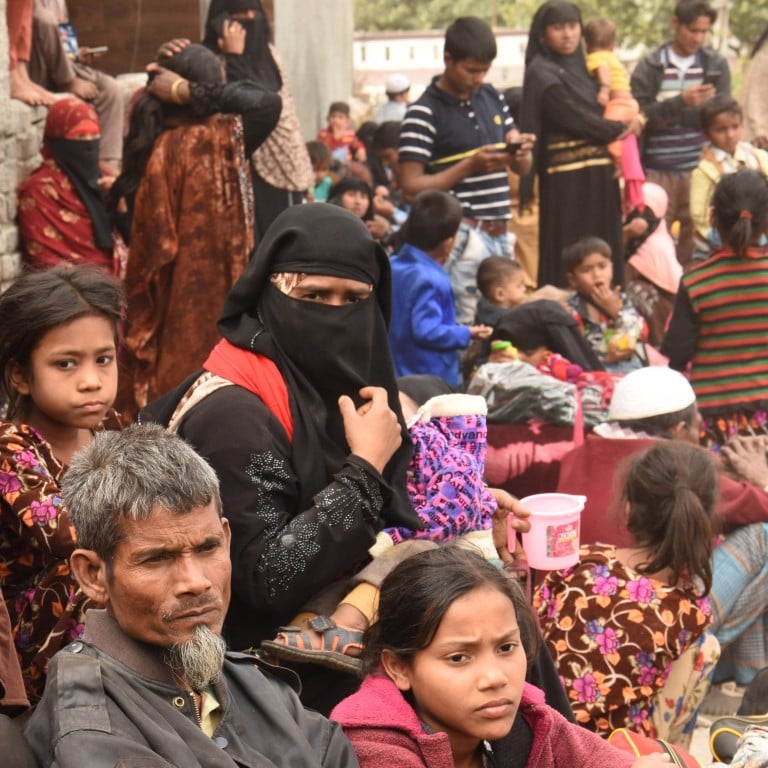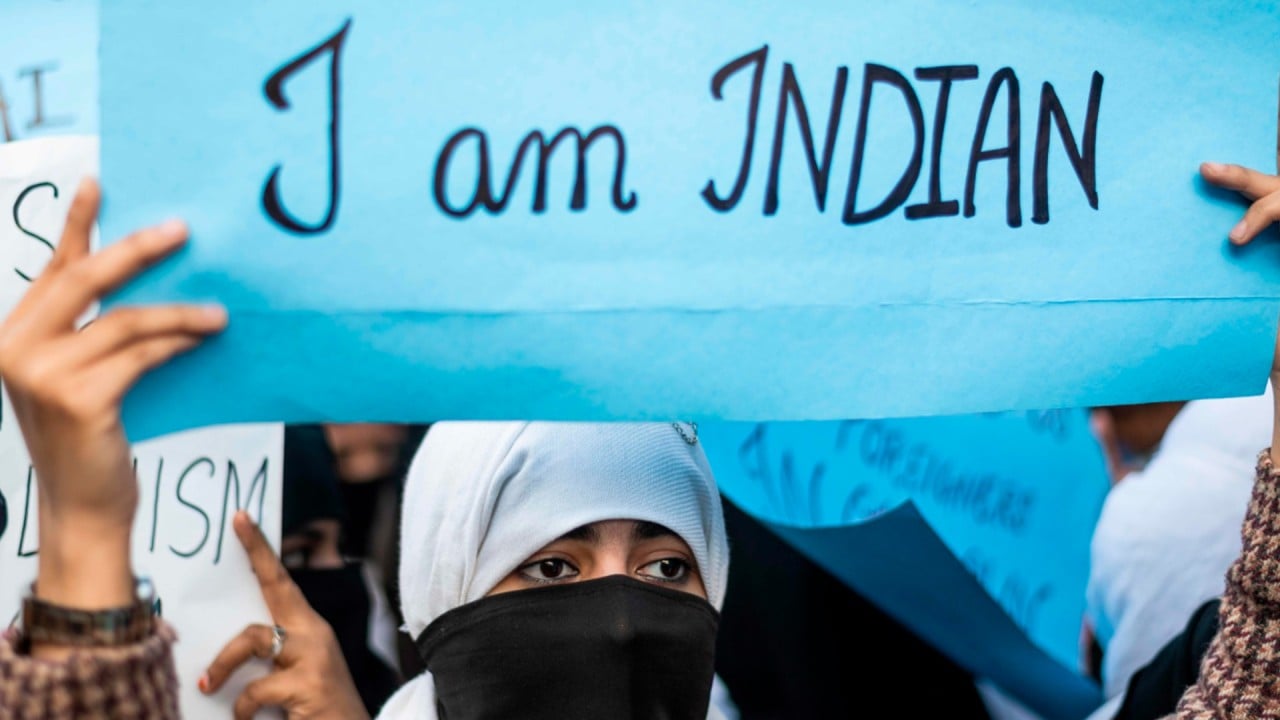
India lambasted for deporting Rohingya refugees to Myanmar in violation of international law
- The move to deport the Rohingya refugees happened just as India enacted a controversial new citizenship law
- The Rohingya are at risk of becoming ‘victims of genocide’ amid the ongoing civil war in Myanmar, a rights advocate says
The CAA grants citizenship to the followers of six religions – Hindus, Sikhs, Buddhists, Jains, Parsees and Christians – who came to India from Pakistan, Bangladesh and Afghanistan before 2015 and faced religious persecution. Muslims, however, are conspicuously absent from the list.
As a result, the CAA does not apply to the Rohingya, a mainly Muslim ethnic minority from Myanmar’s Rakhine State, rendering them without basic rights within India.
As Myanmar’s civil war halts India-funded project, will China take advantage?
Abdul Rohin, a 50-year-old Rohingya Muslim, came to India in 2014 with his family. Living in the northern state of Jammu, he said that he, his wife and eight children left Myanmar amid the “atrocities” being committed against Rohingya by government forces.
“The ethnic cleansing of Rohingya started in 2012 but at that time, not much of it was reported. So my family and I took asylum in India,” he said.
Rohin, whose 28-year-old son Mohammad Yasin has been held in the detention centre for the past three years, said it was better to die in their homeland than live in humiliation in India.
“Every day we are being humiliated here because of our identity [as Muslims]. My son is in the detention centre for no reason. I don’t even have the money to fight for his case. Life is miserable here,” Rohin said.
Is India’s opposition ‘in disarray’ to challenge Narendra Modi in election?
The Office of the United Nations High Commissioner for Refugees (UNHCR) has reported that nearly 79,000 refugees from Myanmar are living in India including around 22,000 Rohingya registered with the UN agency. Most Rohingya in India have been issued UNHCR cards recognising them as a persecuted community.
Last month, the Indian state of Manipur sent the first group of 77 refugees back to Myanmar after the northeastern state witnessed sporadic ethnic violence that had killed nearly 200 people.
“First batch of Myanmar nationals who entered India illegally deported today [sic],” Manipur Chief Minister Biren Singh posted on X, sharing a video of the people being sent off.
Three days after Manipur’s crackdown on Rohingya, Prime Minister Narendra Modi’s government announced that the CAA would grant Indian citizenship to persecuted minorities from neighbouring countries.
Kobir Khajuri, who has been living in India since 2011, said he and his family are anguished at the thought of being sent back to Myanmar.
“The situation is not conducive back home. The Indian government has taken care of us [Rohingya] all these years. I hope they will be considerate this time also,” 44-year-old Khajuri said.
“Once the situation becomes better, we will go ourselves. We don’t even want citizenship in India. We are Burmese and want to go back to our country one day,” added Khajuri, who lives with his two children and a wife in Jammu.
Sabber Kyaw Min, director of the Rohingya Human Rights Initiative, told This Week in Asia that India should adopt a more humanitarian approach while dealing with its Rohingya refugees, especially when they risk being caught in the crossfire in Myanmar’s civil war.
“We are the largest persecuted community in the world today. The Arakan Army is targeting civilians and occupying Rohingya houses. On the other hand, the Myanmar government is forcing Rohingya to join the army and using them as human shields to fight against the rebels,” Min alleged.
Min noted that under Article 21 of the Indian Constitution – which guarantees all individuals a right to life and liberty whether they be Indian or foreign nationals – the Indian government is duty-bound to provide shelter to Rohingya refugees.
“We are victims of genocide. All we want is a shelter. Forcing us out of the country is not the way you treat human crises,” Min said.
While India is showing magnanimity by giving citizenship to other persecuted communities, it should at least provide temporary shelter to Rohingya Muslims as well, he said.
On March 9, the US State Department expressed its concern about the recent deportations from India to Myanmar including refugees and asylum seekers.
Addressing a press briefing, a State Department spokesperson reiterated calls by UN human rights organisations “urging Burma’s [Myanmar’s] neighbours to offer refuge and protection to all those fleeing violence and persecution”.
Is there still room for revival of Pakistan’s trade ties with India?
India is not a signatory to the 1951 UN Refugee Convention, which spells out the rights of refugees and a state’s responsibilities towards them.
However, civil society member and former diplomat K.P. Fabian noted that India is a signatory of the 1948 Universal Declaration of Human Rights (UDHR), under which it is required to protect the right to life of all people, not only citizens of India.
“When you know that sending these refugees back risks them being tortured or killed, then what India is doing is not correct under international law,” Fabian said.
A large area in Rakhine State and southern Chin State has already been taken over by the Arakan Army. The Indian government issued a travel advisory earlier this month, advising all Indian nationals to avoid visiting Rakhine due to the ongoing conflict between the Myanmar junta and the Arakan Army.
Meenakshi Ganguly, deputy director of Human Rights Watch’s Asia, said that international law requires that no one be returned to a place where their lives and liberty could be at stake.
“Indian authorities deporting refugees from Myanmar, including the Rohingya, is extremely dangerous, particularly because there is ongoing fighting between junta forces and armed groups in various parts of the country,” Ganguly said.
While the CAA does not apply to asylum seekers from Myanmar, India’s previous refugee policies have accorded protections to people at risk, Ganguly added.
Is India’s billion-dollar aid to Bhutan aimed at curbing China’s influence?
“Most refugees will choose to voluntarily return when it is safe for them to do so. The Indian government should instead work with the Myanmar junta to press for those conditions, including by restoring the elected government,” she said.
Hong Kong-based rights activist Mohammad Ashrafuzzaman said that India is explicitly disregarding international norms by deporting the Rohingya refugees who are victims of a genocidal campaign.
“Such forced deportation violates Article 14 of the UDHR and exposes the country’s failure to adhere to the principles of non-refoulement,” Ashrafuzzaman said.
Refoulement refers to the practice of returning refugees to their country where they could suffer persecution.
India’s actions amount to complicity in international crimes, Ashrafuzzaman said. Its decision to deport the Rohingya is not befitting of a country pursuing a permanent seat at the UN Security Council, said the consultant at Melbourne-based Capital Punishment Justice Project.
Ashrafuzzaman said that Delhi has established a reputation for endangering non-Hindu ethnic minority communities through various legislative and violent actions.
“Refusal to provide temporary shelter to the Rohingya refugees, who are Muslims by faith, appears to be an integral part of the government’s sustained policy to make the non-Hindu communities vulnerable by all means.”


